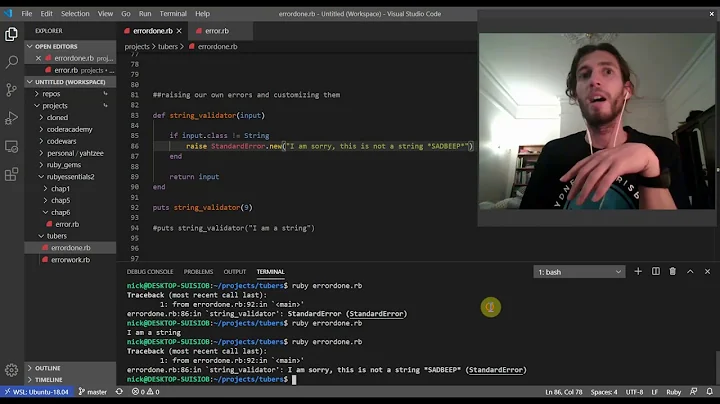Ruby: No Block Given error
Solution 1
If you have yield within your method definition, that means you have to obligatorily pass a block when you use it (unless the part including it is not executed according to conditioning etc.). (You might already know, but in case you don't: a block is something that is described as {...} or do ... end) And yield will refer to the block.
If you want to make a block optional, then one way to do it is to put the & symbol before the variable name.
def method(argument, &block_argument)
if block_argument # block is given
block_argument.call(argument_for_block) # use call to execute the block
else # the value of block_argument becomes nil if you didn't give a block
# block was not given
end
end
This will allow optional block. Or, as suggested by Squeegy,
def method(argument)
if block_given? # block is given
yield(argument_for_block) # no need to use call to execute the block
else
# block was not given
end
end
will also work.
Solution 2
Because you're calling yield in your to_tut() method, this line will fail:
tut = Tut.to_tut( "Wow! Look at this get converted to Tut!" )
You either need to give a block (as you did in the first commented-out call to Tut.to_tut()), or you need to modify your to_tut() function to make the code block optional:
def self.to_tut string
string.each_char do |c|
c += "ut" if @@consonants.find { |i| i == c.downcase }
yield c if block_given?
end
end
Related videos on Youtube
Comments
-
James Titus about 4 years
I keep getting a 'no block given' error when trying to pass the string to the is_tut? method. I am new to Ruby and have no idea what I'm doing wrong. Any and all help would be appreciated.
class Tut @@consonants = ["b","c","d","f","g","h","j","k","l","m","n","p","q","r","s","t","v","w","x","y","z"] def is_tut? string if string =~ /^(([b-df-hj-np-z]ut)|([aeiou\s])|[[:punct:]])+$/i yield else false end end def self.to_tut string string.each_char do |c| c += "ut" if @@consonants.find { |i| i == c.downcase } yield c end end def self.to_english string array = string.split // array.each do |c| if @@consonants.find { |i| i == c.downcase } array.shift array.shift end yield c end end end #Tut.to_tut( "Wow! Look at this get converted to Tut!" ) { |c| print c } # should output : Wutowut! Lutookut atut tuthutisut gutetut cutonutvuteruttutedut tuto Tututut! puts puts tut = Tut.to_tut( "Wow! Look at this get converted to Tut!" ) puts "from return: #{tut}" puts #Tut.to_tut( "Wutowut! Lutookut atut tuthutisut gutetut cutonutvuteruttutedut tuto Tututut!" ) { |c| print c } # should outout : Wutowut! Lutookut atut tuthutisut gutetut cutonutvuteruttutedut tuto Tututut! puts puts #tut = Tut.to_tut( "Wutowut! Lutookut atut tuthutisut gutetut cutonutvuteruttutedut tuto Tututut!" ) #puts "from return: #{tut}" puts #tut_string = "" #Tut.to_tut( "I'm in tut but I want to be in english." ) { |c| tut_string += c } #puts tut_string # should output : I'mut inut tututut bututut I wutanuttut tuto bute inut enutgutlutisuthut. puts #Tut.to_english( tut_string ) { |c| print c } # should output : I'm in tut but I want to be in english.-
 PJP about 13 yearsJust as a tip, a more Ruby-ish way to define your consonants would be:
PJP about 13 yearsJust as a tip, a more Ruby-ish way to define your consonants would be:@@consonants = ('a' .. 'z').to_a - %w[a e i o u]
-
-
Alex Wayne about 13 yearsOr you could just use
block_given?to something likeyield if block_given? -
 sawa about 13 yearsThat's another good way.
sawa about 13 yearsThat's another good way.block_givenchecks if there is a block, and if not, it returns false, andyieldwill not be executed, which means it will not cause an error. -
James Titus about 13 yearsSweet!! That worked! Thanks everyone! I may be back here with more questions later. Appreciate the help.





